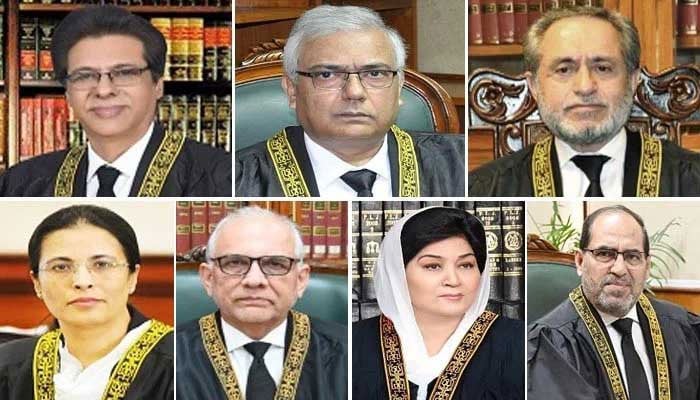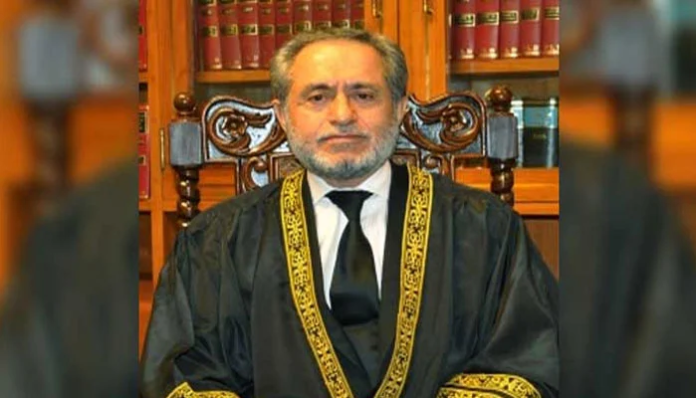ISLAMABAD, NOV 20 (DNA): Supreme Court Justice Jamal Khan Mandokhail has expressed annoyance over global bodies’ rankings of Pakistan’s judiciary, which place it extremely low.
“I do not know where these numbers emerge from. Some place our judiciary on 120 while others on 150,” he said during a hearing conducted by the constitutional bench over litigants’ lack of access to the apex court.
World Justice Project’s Rule of Law index for the year 2024 shows Pakistan’s global ranking at number 129 out of a total of 142 countries assessed, which is a slight improvement from the previous year.
Justice Mandokhail is part of the constitutional bench — led by Justice Amin-ud-Din Khan — formed under the 26th Constitutional Amendment.

Apart from Justices Khan and Mandokhail, the bench includes five other members — Justice Ayesha Malik, Justice Muhammad Ali Mazhar, Justice Hassan Azhar Rizvi, Justice Naeem Akhtar Afghan, and Justice Musarrat Hilali.
Multiple pleas were heard by the constitutional bench today, which included a lack of petitioners’ access to SC and government employees who were not assigned duties. A petition was also heard against declaring the Sunni Ittehad Council (SIC) as a parliamentary party.
‘Lack of access’
The SC heard a petition regarding the lack of access for litigants to the country’s highest court.
During the proceedings, the petitioner argued that 90% of litigants are unable to approach the Supreme Court, highlighting the challenges faced by the public in seeking justice.
Responding to the claim, Justice Mandokhail remarked that the petitioner’s arguments were being heard directly, questioning what further access was required.
Justice Mandokhail also expressed annoyance, stating that such petitions undermine the institution itself.
Referring to international rankings, he noted that while some claim Pakistan’s judiciary ranks 120th globally and others 150th, it remains unclear where these figures originate.
After deliberation, the constitutional bench ultimately dismissed the petition.
Plea against SIC
Moving on, the seven-member bench heard a petition challenging the declaration of the SIC as a parliamentary party.
The petitioner argued that the petition had been submitted within the prescribed time frame; however, now, a review plea was currently pending.
The petitioner also requested the court to consider this matter in connection with other relevant cases.
In response, Justice Mandokhail questioned the petitioner’s intent, asking why they were seeking an unconstitutional action from the court.
He further noted that candidates have the freedom to join or not join a political party of their choice.
Justice Khan also cautioned the petitioner, Molvi Iqbal, reminding him that he was revisiting the same issues that had previously led to restrictions. After deliberation, the constitutional bench upheld the objections raised by the Registrar’s Office and dismissed the petition.
‘Should we dismiss president?’
The apex court heard a petition concerning the dismissal of government officials who did not do their designated jobs or remained unassigned to any duties. The constitutional bench, after reviewing the petition, declared it inadmissible and dismissed it.
During the proceedings, Justice Ayesha pointed out that the petitioner’s request essentially called for the dismissal of all government employees, suggesting that they do not perform any work.
She advised the petitioner to identify the specific officials in question and approach the relevant authorities for action.
Justice Mazhar noted that the petitioner had failed to mention any specific government officials in their application. Meanwhile, Justice Mandokhail questioned the petitioner about which particular task had not been completed, urging them to clarify.
In a more pointed remark, Justice Mandokhail asked, “What do you mean? Should we dismiss the president, prime minister, speaker, and all members of the assembly?”
The petitioner responded by claiming that the system had collapsed and that no one was willing to listen to the truth. Ultimately, the constitutional bench dismissed the petition, declaring it inadmissible.
Time frame for deciding cases
The Supreme Court also heard a petition seeking the establishment of a time frame for completing trials in courts.
Justice Ayesha, during the proceedings, observed that several laws, including those related to criminal cases, already specify time frames.
She advised the petitioner to approach Parliament for legislation on this matter if further measures were required. The petitioner then argued that trials often take 20 to 40 years to conclude.
In response, Justice Malik cautioned against making sweeping allegations, acknowledging that while the system is not perfect, progress is being made.
She further noted that the petition pertained to national judicial policy and clarified that the court could not issue directives under Article 184(3) of the Constitution.
The top court’s judge asked that the petitioner to engage with ongoing reform efforts rather than seeking the court’s intervention, as this did not fall within its purview.
Justice Mandokhail reiterated that the judiciary operates within the bounds of the Constitution and the law, while Justice Hilali warned that a stringent response from the courts could lead to further disillusionment.
Justice Ayesha also pointed out that the Law and Justice Commission is the appropriate forum for addressing judicial reforms.
Following the arguments, the constitutional bench dismissed the petition, deeming it inadmissible.

















